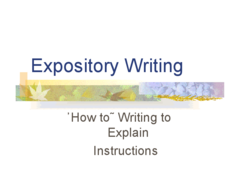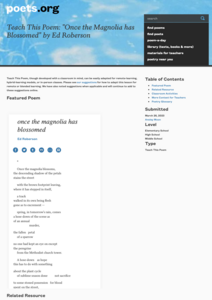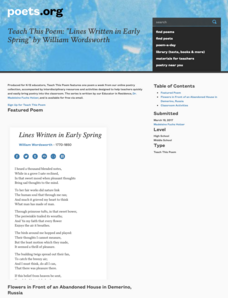Curated OER
Mechanics Mania
As part of test prep, or a way to cement writing skills, this presentation would be superb. Students often have trouble with capitalization rules and commas. Coverage of mechanics uses well-thought-out examples.
Curated OER
Reading Strategies
Good readers have internalized a system of strategies to understand text. While most reading programs explicitly teach these strategies, this presentation could be used as a discussion starter to help students understand such things as...
Curated OER
Card Catalog Cards
Prepare students on how to use the library's card catalog system as well as the online version. Author, card catalog, the Dewey system, and so much more is addressed. This would be a great tool to use in the classroom or library.
Curated OER
Expository Writing:
As a review of expository writing, this comprehensive presentation could be used with a variety of grade levels. It gives a well-thought out and detailed overview of this writing process.
Curated OER
Subjects and Predicates
From simple subjects to compound predicates, this PowerPoint is a great tool for teaching the two parts of a sentence: subject and predicate. There are thirty-one colorful and interactive slides in this presentation which includes brief...
Curated OER
State of Being Verbs
Have your class engage in this excellent language arts presentation on verbs. The focus is on the differences between action verbs and state of being verbs. Students choose the state of being verbs on one slide, and move on when they are...
Curated OER
Subject-Verb Agreement
For English speakers and English Language Learners alike, subject-verb agreement can be a tricky task in sentence structure. This PowerPoint provides helpful explanations for different instances in writing sentences, as well as ten...
Curated OER
Tools, Technologies and Inventions through the years
5th graders will gain an understanding of how, what, and why people invent tools. This PowerPoint provides a complete description of what tools are, types of tools, why we make tools and what impact they have had on society. There are...
Education City
Black History Month
New ReviewEnhance Black History Month with a twenty-page resource designed to boost scholars' knowledge of the great accomplishments made by African Americans. Learners take in fun facts about famous inventors such as George Washington Carver and...
Education City
Reading Comprehension
New ReviewCelebrate National Reading Month in March—or any month of the year—with a selection of versatile graphic organizers. The worksheets prompt readers to compare characters easily, predict what will happen next in a story, track their...
Carolina K-12
The Revolutionary Times
Be sure to grab a copy of the Revolutionary Times! Scholars take a step back in time to report on topics set in the revolutionary period. Events include the ride of Paul Revere, the Battle of Saratoga, and more.
Academy of American Poets
Teach This Poem: "The Metier of Blossoming" by Denise Levertov
Poetry analysis need not be a lugubrious exercise for young learners. The approach used with Denise Levertov's poem, "The Metier of Blossoming" is one of close observation, of noticing and reflecting on the words, phrases, and images the...
Academy of American Poets
Teach This Poem: “Crisscross” by Arthur Sze
Arthur Sze's poem "Crisscross" launches a lesson that asks scholars to use their observation skills. They first draw an image that reflects what crisscross means to them. They then examine a photograph of a lightning strike and list what...
Academy of American Poets
Teach This Poem: "Instructions on Not Giving Up" by Ada Limón
What do the myth of the phoenix bird and Ada Limón's poem "Instructions on Not Giving Up" have in common? Young scholars create a list of what they notice about both the myth and poem, then consider what the similarities might indicate...
Academy of American Poets
Teach This Poem: "somewhere i have never travelled,gladly beyond" by E. E. Cummings
Scholars engage in a role-play exercise, compare their demonstration to a time-lapse video, and to a poem by E.E. Cummings. The ensuing discussion asks learners to consider the similarities among the three.
Academy of American Poets
Teach This Poem: "Once the Magnolia has Blossomed" by Ed Roberson
A free write, an image of magnolia leaves, and the Ed Roberson's poem "Once the Magnolia has Blossomed" ask scholars to use their noticing skills to reflect on the lesson beauty teaches about loss and grief.
Academy of American Poets
Teach This Poem: "Lines Written in Early Spring" by William Wordsworth
William Wordsworth's poem "Lines Written in Early Spring" lets learners sharpen their observation skills. Class members first closely examine the image "Flowers in Front of an Abandoned House in Demerino, Russia," listing what they...
National Endowment for the Humanities
Shakespeare's Julius Caesar: Leadership and a Global Stage
Shakespeare's Julius Caesar is, among other things, the study of a ruler's ambitions. Young scholars watch videos, read articles, and keep a Commonplace Book while studying the play. At the end of Act III, pupils stage the play that...
National Endowment for the Humanities
"From Citizen, VI [On the Train the Woman Standing]," Claudia Rankine
Claudia Rankine's poem "From Citizen, VI [On the Train the Woman Standing]," asks readers to consider direct and more subtle forms of prejudice. After discussing the format of the poem, its tone, and the emotions expressed, class members...
Academy of American Poets
Incredible Bridges: “Cotton Candy” by Edward Hirsch
Read it, hear it, see it, do it! Young poets experience Edward Hirsch's memory poem, "Cotton Candy," by first closely reading the poem silently, then aloud, watching a video of the poet reading it, and crafting their memory poem of an...
Curated OER
Modern Day Editing
Abigail Adams' letters reveal how the English language has changed and become more standardized over the last 200 years. To underscore this point, pupils edit one of Adams' letters
Curated OER
Abigail as Mother (Part II)
Different tones for different audiences. That's the big idea behind the second lesson in a two-part series that reveals Abigail Adams as a mother. Scholars examine letters Abigail Adams wrote to her sons, John Quincy Adams and Charles...
Curated OER
Abigail as Mother (Part 1)
In part one of a two-part series, scholars compare two of Abigail Adams' letters: one to her son and the other to her daughter. Researchers use the provided worksheets to contrast evidence of the tone and themes in the two letters.
Curated OER
Abigail Adams and Thomas Jefferson
In addition to her letters to her husband, family members, and friends, Abigail Adams also wrote to key political figures of the time. In this lesson, scholars examine letters Adams' wrote to and received letters from Thomas Jefferson...




















!["From Citizen, VI [On the Train the Woman Standing]," Claudia Rankine Lesson Plan "From Citizen, VI [On the Train the Woman Standing]," Claudia Rankine Lesson Plan](http://content.lessonplanet.com/resources/thumbnails/456347/large/u2nyzwvuc2hvdf8ymdizltazlte3x2f0xzeyljexljq2x1bnlnbuzw.png?1679080322)




